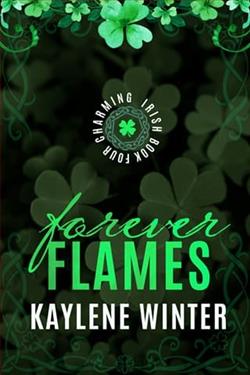Page 122 of It Happened on the Lake
“Sorry,” he said and tried to skirt the guy.
“You a cop?” the man almost yelled.
“What? No. I’m . . . Cynthia’s son.” Levi hooked his thumb and motioned to the door. “Cynthia Hunt.”
“Her boy?” The old man eyed Levi suspiciously, his brow furrowing, his unruly eyebrows lifting over thick glasses. Frowning, he shook his head. “Her boy disappeared. Years ago.”
“My brother.” Did he know this man?
“Oh! Let me see.” Eyes thinning in appraisal, the stooped man asked, “You’re the younger one?”
“Yes. Levi.” Levi stuck out his hand and introduced himself as the old guy lifted a gnarled palm.
His grip was like iron.
“Yes,” the old guy said. “Yes, you are. You were a troublemaker in your youth. Looks like you maybe straightened up. She said so.”
Levi assumed the man was talking about his mother.
“I’m Ed,” he said. “Ed Sievers, we were neighbors.”
Old Man Sievers. With the barking dog and rumored bomb shelter. His long hair was little more than white stubble over a pink pate these days, and his face was lined with deep wrinkles. Thick glasses bridged his nose, and rather than camouflage gear he’d picked up at the army surplus store, he was now dressed in an oversized robe and striped pajamas.
Sievers looked over his shoulder and whispered, “This is a hellhole. Yep. That’s what it is. Don’t let anyone tell you any different.” He paused and added, “Sorry about your mother.” He clucked his tongue and shook his head. “A shame. That’s what it was. A damned shame.”
“You knew her?”
He pointed a big-knuckled finger to the door across the hall. “We were neighbors here, too.”
“Do you know why she—?”
“Why she lit herself up like a Christmas tree on the lake? Nope. Not a clue. But I know she was upset that the girl was coming back to town.” His head was bowed as he adjusted his walker, and he looked up at Levi over the rims of his glasses.
“The girl? You mean Harper Prescott?”
“That her name now? She’s Livvie Dixon’s granddaughter,” he said firmly. “You know, her mother died in the lake, too. Years ago. I saw her. Had to run over to that cop’s house—Watkins. Bah! Never cared for him. You remember?”
Levi had never forgotten that night. His gut twisted at the memory of his father and Gerald Watkins retrieving Anna Reed’s body.
Sievers was hitching his walker across the hall. “Come on in,” he said as he unlocked the door and a sudden burst of yapping greeted them. As he opened the door, a tiny terrier shot out—a scruff of mottled black and brown fur that bounced at Ed’s feet.
“Shh. Jake. Shh. You’ll get me in trouble.” But Ed chuckled as he bent down and picked up the perky-eared pup, which rewarded him by washing his face with his tongue. “Come in, come in,” he said, looking over his shoulder at Levi. “I’ve got something for you.”
He set the dog on a carpet worn with the tracks of his walker, then opened a drawer in the small kitchenette within the studio unit that held a tiny table, large recliner, and twin bed. “Let’s see . . .” He pulled out a wallet, some receipts, a bottle opener, a book of stamps, and finally a small sealed envelope that Levi recognized as his mother’s personal stationery, embossed with CLH, Cynthia Larsen Hunt.
A lump grew in Levi’s throat as the old man handed him the small envelope with his name written in his mother’s hand.Levi.His throat grew tight. “She gave this to you, when?” he asked.
The old man rubbed the stubble on his chin. “That night,” he said, as if Levi should have guessed the truth. “Just before I helped her get out of here.”
Chapter 29
Since Beth insisted on seeing “everything” from the lowest level of the manor on up, Harper complied, starting with the boathouse. Cut into the stone of the island, the boathouse was really a cavern that had been fitted with heavy crossbeams and a boat lift decades earlier.
Inside, the air was heavy and smelled dank, the odors of waterlogged rot and decay pervasive.
“Dear Lord, no one’s been down here in a while,” Beth observed.
A long while, Harper thought as she reached for the light switch. Just one of the two dim lights fizzled on, casting more shifting reflective shadows onto the rough stone walls, offering little illumination. Gramps’s old wooden Chris-Craft was raised on the lift, dangling awkwardly above the water, the boat’s hull obviously moldering, the straps supporting it disintegrating.















